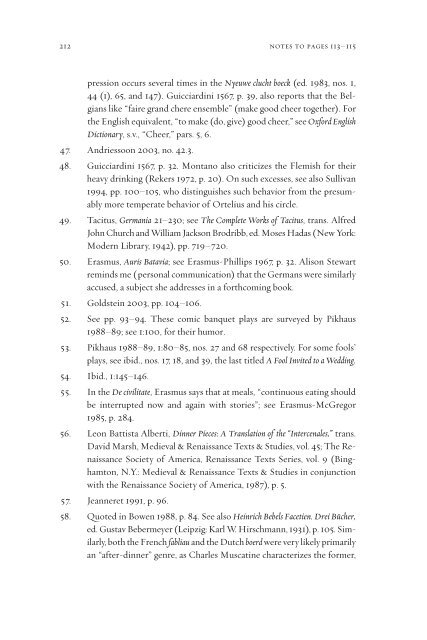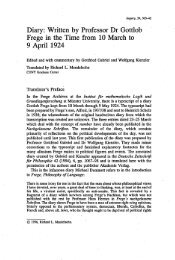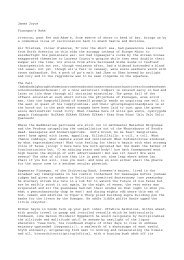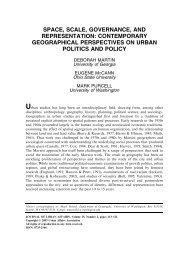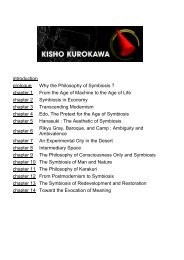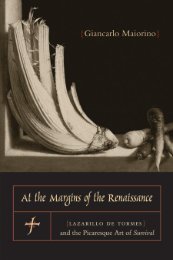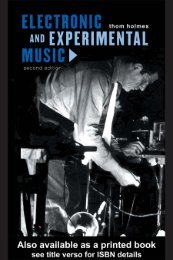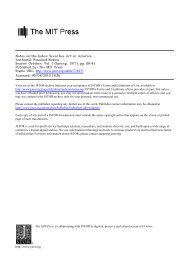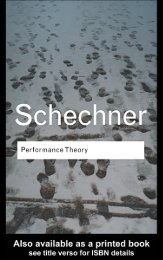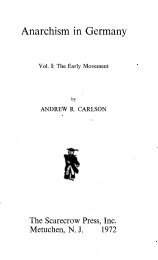Pieter Bruegel and the Art of Laughter - AAAARG.ORG
Pieter Bruegel and the Art of Laughter - AAAARG.ORG
Pieter Bruegel and the Art of Laughter - AAAARG.ORG
Create successful ePaper yourself
Turn your PDF publications into a flip-book with our unique Google optimized e-Paper software.
212 notes to pages 113–115<br />
pression occurs several times in <strong>the</strong> Nyeuwe clucht boeck (ed. 1983, nos. 1,<br />
44 (1), 65, <strong>and</strong> 147). Guicciardini 1567, p. 39, also reports that <strong>the</strong> Belgians<br />
like “faire gr<strong>and</strong> chere ensemble” (make good cheer toge<strong>the</strong>r). For<br />
<strong>the</strong> English equivalent, “to make (do, give) good cheer,” see Oxford English<br />
Dictionary, s.v., “Cheer,” pars. 5, 6.<br />
47. Andriessoon 2003, no. 42.3.<br />
48. Guicciardini 1567, p. 32. Montano also criticizes <strong>the</strong> Flemish for <strong>the</strong>ir<br />
heavy drinking (Rekers 1972, p. 20). On such excesses, see also Sullivan<br />
1994, pp. 100–105, who distinguishes such behavior from <strong>the</strong> presumably<br />
more temperate behavior <strong>of</strong> Ortelius <strong>and</strong> his circle.<br />
49. Tacitus, Germania 21–230; see The Complete Works <strong>of</strong> Tacitus, trans. Alfred<br />
John Church <strong>and</strong> William Jackson Brodribb, ed. Moses Hadas (New York:<br />
Modern Library, 1942), pp. 719–720.<br />
50. Erasmus, Auris Batavia; see Erasmus-Phillips 1967, p. 32. Alison Stewart<br />
reminds me ( personal communication) that <strong>the</strong> Germans were similarly<br />
accused, a subject she addresses in a forthcoming book.<br />
51. Goldstein 2003, pp. 104–106.<br />
52. See pp. 93–94. These comic banquet plays are surveyed by Pikhaus<br />
1988–89; see 1:100, for <strong>the</strong>ir humor.<br />
53. Pikhaus 1988–89, 1:80–85, nos. 27 <strong>and</strong> 68 respectively. For some fools’<br />
plays, see ibid., nos. 17, 18, <strong>and</strong> 39, <strong>the</strong> last titled A Fool Invited to a Wedding.<br />
54. Ibid., 1:145–146.<br />
55. In <strong>the</strong> De civilitate, Erasmus says that at meals, “continuous eating should<br />
be interrupted now <strong>and</strong> again with stories”; see Erasmus-McGregor<br />
1985, p. 284.<br />
56. Leon Battista Alberti, Dinner Pieces: A Translation <strong>of</strong> <strong>the</strong> “Intercenales,” trans.<br />
David Marsh, Medieval & Renaissance Texts & Studies, vol. 45; The Renaissance<br />
Society <strong>of</strong> America, Renaissance Texts Series, vol. 9 (Binghamton,<br />
N.Y.: Medieval & Renaissance Texts & Studies in conjunction<br />
with <strong>the</strong> Renaissance Society <strong>of</strong> America, 1987), p. 5.<br />
57. Jeanneret 1991, p. 96.<br />
58. Quoted in Bowen 1988, p. 84. See also Heinrich Bebels Facetien. Drei Bücher,<br />
ed. Gustav Bebermeyer (Leipzig: Karl W. Hirschmann, 1931), p. 105. Similarly,<br />
both <strong>the</strong> French fabliau <strong>and</strong> <strong>the</strong> Dutch boerd were very likely primarily<br />
an “after-dinner” genre, as Charles Muscatine characterizes <strong>the</strong> former,


